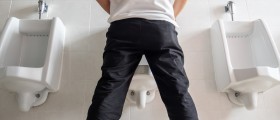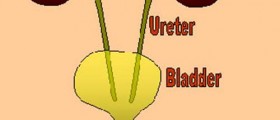Bladder Distention
Bladder distention is abnormal extension and enlargement of the bladder. It is most commonly caused by retention of urine due to impossibility of urine to be passed. Bladder distention features with increased urge to urinate, frequent need to urinate and intensive pain in the bladder. There is a variety of reasons why bladder distention occurs. Mechanical, anatomical and neuromuscular factors are only some of the contributors of the diseases.
Bladder distention can be a side effect of certain medications and it may also be a consequence of some medical conditions. All in all, no matter what the cause is the patient requires urgent help and the symptoms are commonly treated by urinary catheters. Furthermore, underlying cause of bladder distention needs to be identified as well and treated properly.

Causes of Bladder Distention
In multiple sclerosis symptoms and signs of the disease are caused due to destruction of myelin of the neurons in the brain and spinal cord. When the process of destruction affects motor neuron that controls bladder one may suffer from bladder distention. So not all the patients suffering from multiple sclerosis develop bladder distention but they are at higher risk of developing it.
Another cause of bladder distention is urethral stricture. Urethral stricture is hardened narrowing of the urethra. Patients suffering from urethral strictures have difficulty with urination and this may eventually result in bladder distention. Urethral stricture is treated surgically.
Benign prostate hyperplasia is enlargement of the prostate. It leads to narrowing of the urethra and blocks the flow of the urine. Urine accumulates in the bladder and bladder distention develops.
And finally, bladder cancer can be another cause of bladder distention. This particularly refers to cancers that form near the internal urethral orifice.
Diagnosis of Bladder Distention
Bladder distention can be easily diagnosed. Apart from the symptoms and signs of this condition, patients report that they have not urinated for a long period of time. Enlarged bladder can be easily palpated and even be clearly noticed.
Treatment for Bladder Distention
The doctors need to establish the underlying cause of bladder distention and treat it either conservatively or surgically.
In the meantime patients are inserted urinary catheter to ease urination.
Surgery for bladder distention is left as last option and it is only performed in patients who do not respond to conservative treatment. The goal of the surgery is to remove or replace damaged part of the bladder.
People suffering from bladder distention as well as those prone to this medical condition need to stay away from caffeinated drinks and alcohol since caffeine and alcohol cause urine retention and may aggravate already existing bladder distention.
Relationship between Bladder Distention and Blood Pressure
- The urine storage process has been known to depend on the coordinated control of a storage chamber, the bladder body, its outlets, the bladder base and urethra, but the mechanisms underlying this process are poorly understood.
- Another possible cause of the difference of BP between before and after urine-voiding is a "white coat" effect. When BP was measured for the first time at the health promotion center, subjects might be somewhat nervous. During the second measurement of BP, subjects might be settled. This change of psychological state can influence their BP.
- The duration of bladder distension was calculated indirectly by asking to the patients. Although only the patients insisting they surely remembered the duration of urine-holding were included and abdominal ultrasound was performed to confirm a full bladder, depending on patient's memory is a limitation in this study.
- Ideally, BP should have been measured first at the emptying state in bladder, and then BP should have been rechecked repeatedly over time till bladder would be full. The present study, however, could not get the baseline BP because when the subjects had arrived at the health promotion center, they had already been holding urination at least for an hour.
- medlineplus.gov/ency/article/000474.htm
- www.nhs.uk/conditions/interstitial-cystitis/
- Photo courtesy of OpenStax College via Wikimedia Commons: commons.wikimedia.org/wiki/File:2605_The_Bladder.jpg

















Your thoughts on this
Loading...